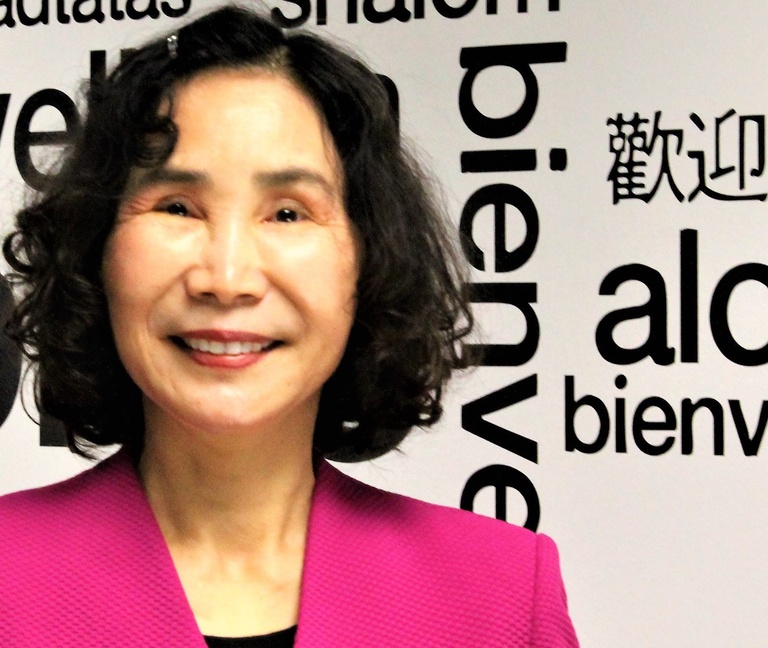Helen Shen, professor and DEO of the UI Department of Asian & Slavic Languages and Literatures, has been awarded a STARTALK grant for the 2022-23 school year. STARTALK is a program of the National Security Agency, aimed at increasing the number of U.S. citizens learning, speaking, and teaching critical foreign languages. Learn more in the question and answer piece below.

Helen Shen
1. What is your teaching and research area?
My primary teaching and research area is Chinese as a second language acquisition and education. English is my second language. Thirty years ago, when I was a college student in China, I majored in Chinese language and literature. I remember that our curriculum included British and American Literature in Translation. From that course, I learned about American life by reading Chinese translations of books written by modern American writers. After coming to the U.S. in 1991, I had the opportunity to read these books in their original language and realized that this creates a much deeper connection between the reader and writer. Learning to speak English has given me a key to enter America’s multifaceted culture. In this multilingual world, I view speaking more than one language as a unfair advantage for better understanding people who speak different languages. My research and teaching can help non-Chinese-speaking students speak Chinese so that they can converse with the 18.47% of the world’s population who speak Chinese – a contribution that I view as a privilege.
2. How will the STARTALK grant that you were recently awarded help you?
The STARTALK grant will allow us to carry out a STARTALK pilot program – the STARTALK Year-Round Chinese Program for Iowa High Schools (2022–23) – comprising three semesters and one summer day camp specially designed for Iowa junior and senior high school students in grades 8–11 who wish to learn Chinese. The learning will take place by virtually visiting five cities in China: Beijing; Tianjin; Shijiazhuang; Wuhan; and Chengdu. The instruction will evolve through a theme-based virtual environment, communicative-based teaching methods, technology-enhanced hands-on activities, culture workshops, contextualized performance, and field trips. Participants will earn 11 University of Iowa credits upon successful completion of the program. Selected participants will each receive a scholarship of approximately $6,800 to cover all program costs, including tuition, learning materials, lunches during the summer camp, cultural activities, workshops, and field trips. The program will provide a unique opportunity for Iowa high school students to study Chinese, a highly needed critical language in the U.S.
3. What is your favorite part of being a faculty member at the University of Iowa?
I am grateful for the level of support that I have received from the university, particularly the Center for Asian and Pacific Studies and International Programs since I joined the faculty of the Department of Asian and Slavic Languages in 2002. Their funding support makes it possible to be an active researcher in the field and to share my research at national and international conferences, among other venues.
4. What would you say to colleagues and students who are interested in internationally oriented teaching, research, creative work, and community engagement?
I would tell my colleagues that globalization is a long-term and ongoing process. If we can make people speak more languages, they will have a better understanding of the diverse cultures and societies in their mindset, so that they can communicate meaningfully and effectively with people from different races and ethnic groups. Our world needs more advocates to participate in this great endeavor, so let’s work together to make this world a better place for everyone. As for my students, I would highly encourage them to learn a new language, and stress that they are never too old to learn. The rapid social, economic, and technological changes have brought about new forms of employment. We must keep up with these changes by developing new skills, including to speak new languages.
5. Are there individuals you’d like to thank for their assistance in your grant application process?
I want to thank the following units and individuals for their support and assistance during my grant writing and submission process:
- Instructional team members in the Chinese Program: Yuan Lu, Xi Ma, Dexin Dai, and Na Li, their participation made the STARTALK program possible.
- Ann Knudson, grants administrator of International Programs, for her tireless work gathering all necessary supporting documents and providing technical support for the proposal submission.
- The Center for Asian and Pacific Studies for its funding support to allow collection of authentic cultural materials for the STARTALK program.
- Dr. Matt Degner, superintendent of the Iowa City Community School District, for providing a support letter for the grant application.
- My friends and colleagues who have provided insightful suggestions during my proposal writing.